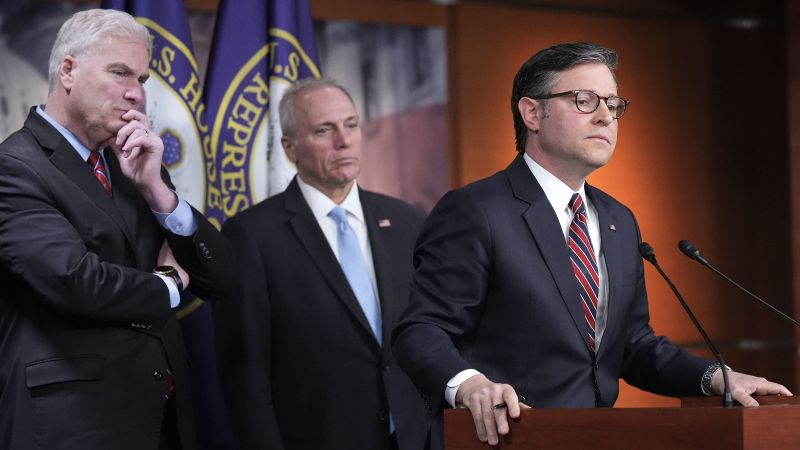CNN
—
House Republican leaders are still trying to resolve major internal battles over President Donald Trump’s massive domestic policy bill even as Speaker Mike Johnson is engaged in last-ditch negotiations to win over GOP members’ conflicting demands before an expected floor vote later this week.
Among the major issues that are still unresolved: The timeframe over when new Medicaid work requirements would kick in, whether to change the federal-state cost sharing program for Medicaid, when green energy tax credits would be phased out and how much Americans can deduct from the state and local taxes they pay.
There are also big questions: How much the sweeping bill will add to the deficit and how many Americans would lose access to benefits like Medicaid and food stamps — since the non-partisan Congressional Budget Office has yet to release an official estimate on the bill’s impact to the debt and the economy.
House GOP leadership aides said Monday morning that key decisions have not been finalized even though Johnson wants the bill passed out of his chamber by Thursday.
“Everything is in plan all the way until the end,” said one leadership aide, noting the talks are “extremely difficult” given the narrowness of the majority and the diversity of the demands. But aides contended that “95%” of the bill had been agreed to among House Republicans.
The bill calls for first-time work requirements for Medicaid beneficiaries to be implemented by 2029, but GOP hardliners are demanding that timeframe be moved up — something that is causing angst among more moderate members. Moreover, some of the hardliners want to pare back the amount of money the federal government pays into state-run Medicaid programs, a change that moderates have long resisted.
Moving up the start date of Medicaid’s work requirements would boost the amount of savings in the bill, but it would also strip coverage from more people, experts say. Currently, the Energy and Commerce Committee’s Medicaid provisions are expected to reduce spending by $625 billion but leave 7.6 million more people uninsured by 2034, according to preliminary estimates from the Congressional Budget Office released by the GOP. The work requirement proposal accounts for nearly half the savings, at $300 billion.
Some of the more moderate GOP members are also demanding an increase of the proposed $30,000 cap on the amount taxpayers can deduct on state and local taxes they pay — a push that would increase the price tag but also cause a revolt on the right.
A source involved in the so-called SALT negotiations told CNN Monday morning that the issue had not been resolved, and they had not heard much on where leadership was going on it. Asked for an update on where leadership had left things over the last 24 hours, the source responded with a cricket emoji.
Johnson is expected to continue talks Monday with his members as they negotiate final changes to the bill before the House Rules Committee meets at 1 a.m. on Wednesday for a key vote to advance the package to the full House.
At that meeting, an amendment would be added to the bill to make the changes to win over holdouts in his conference.
CNN’s Tami Luhby contributed to this report.

